Understanding Your Financial Aid Offer
By now, you have received your financial aid offer. We've gathered some helpful information for you to break it down into understandable pieces so you can plan and budget for college costs.
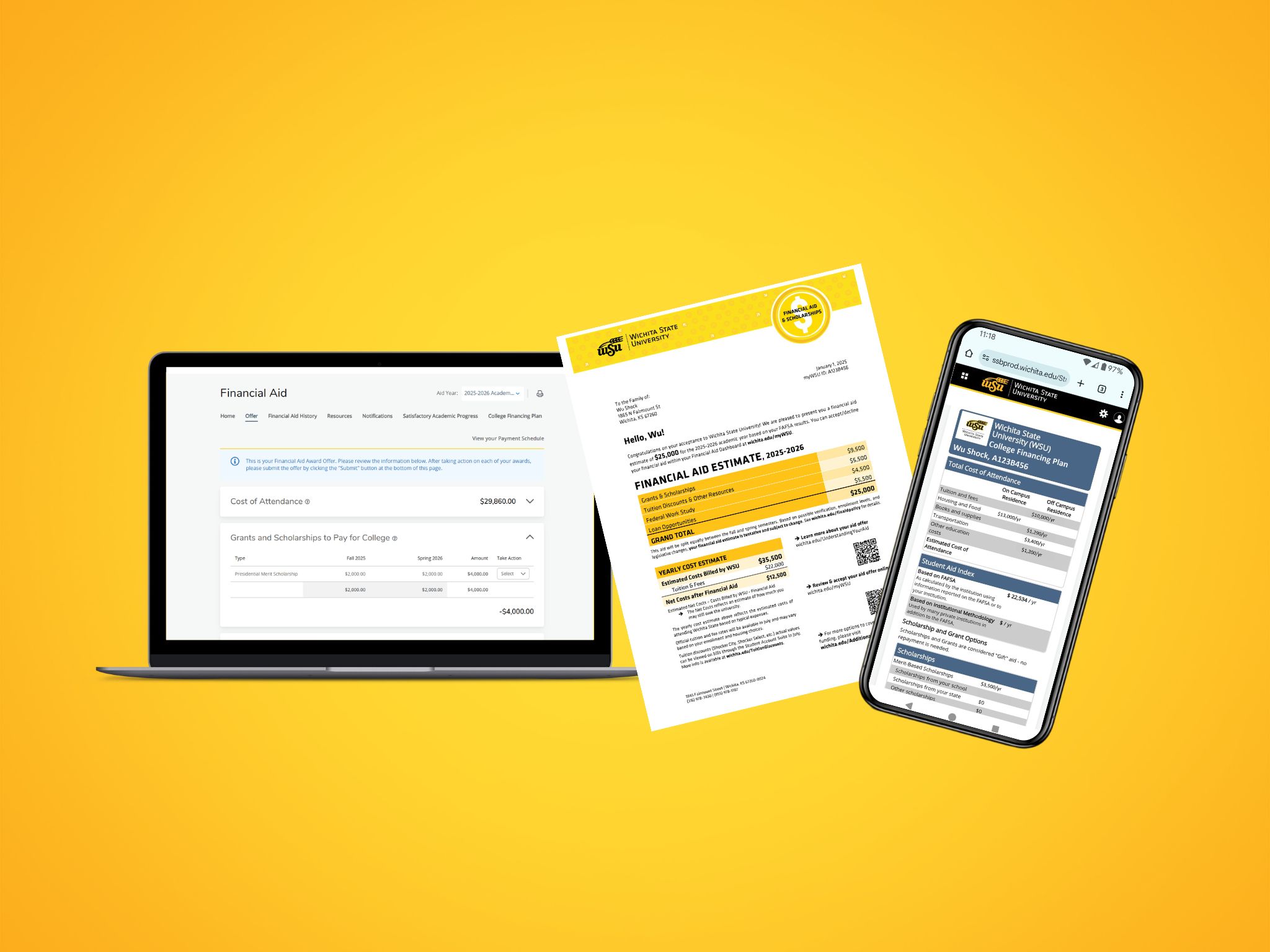
By now, you have received your financial aid offer. We've gathered some helpful information for you to break it down into understandable pieces so you can plan and budget for college costs.
Financial aid is a combination of awarded or loaned money to students and/or their families to pay for educational expenses. It includes scholarships, grants, work-study employment, and loans. We determine your eligibility for financial aid from a number of factors, not just your income. These factors can include your grade level in college, your chosen degree program, your residency, where you plan to live while in college, and whether you intend to enroll full time or part time.
In most cases, the estimated aid will be split equally between the fall and spring semesters. Please be aware your aid offer could change based on changes to your FAFSA, enrollment level, or other factors. See wichita.edu/finaidpolicy for details.
Financial Aid Dashboard: Offer Tab
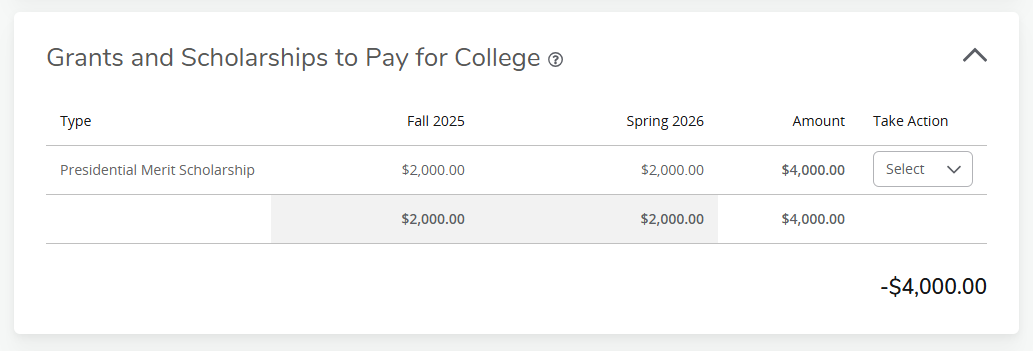
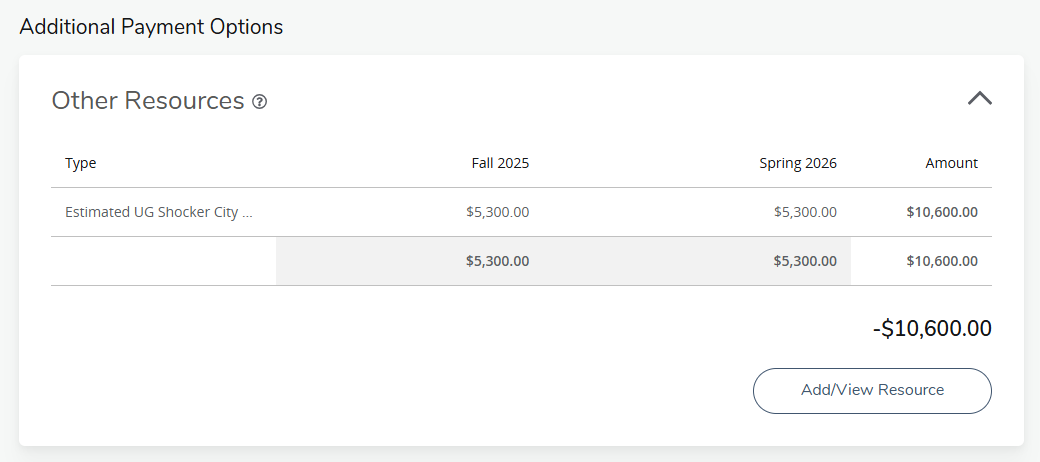
This section includes discounts you qualify for at Wichita State based on meeting certain requirements (i.e. Shocker City Partnership is based on the county you live in). Discounts are initially based on estimates. Official discount rates are typically finalized in July before school begins.
On your Financial Aid Dashboard, tuition discounts and outside scholarship resources can be viewed at the bottom of the Offer tab under "Other Resources." Tuition discounts (Shocker City, Shocker Select, etc.) actual values can be viewed on bills through the Student Account Suite in July. More information about tuition discounts is available at wichita.edu/tuitiondiscounts.
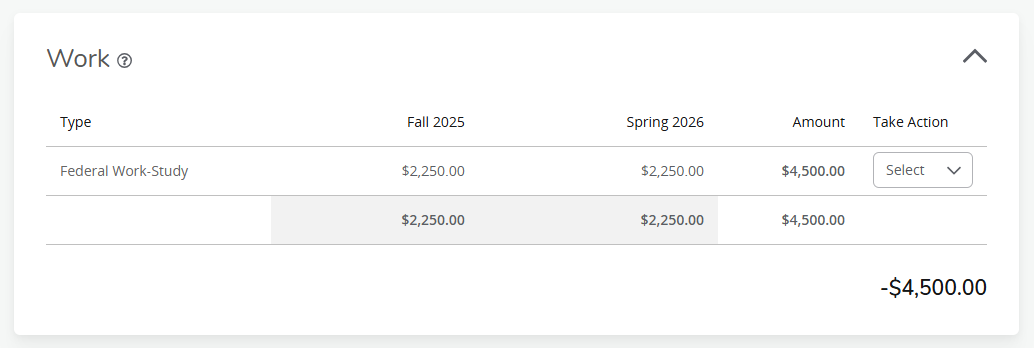
This program gives students an opportunity to earn money while earning a degree at Wichita State. This is an estimate of your eligibility, not a guaranteed award amount. Students can begin searching and applying for campus jobs at jobs.wichita.edu.
To be considered for work study at Wichita State, you must complete the FAFSA by our early application priority date (2025-2026: April 1, 2025) and have financial need.
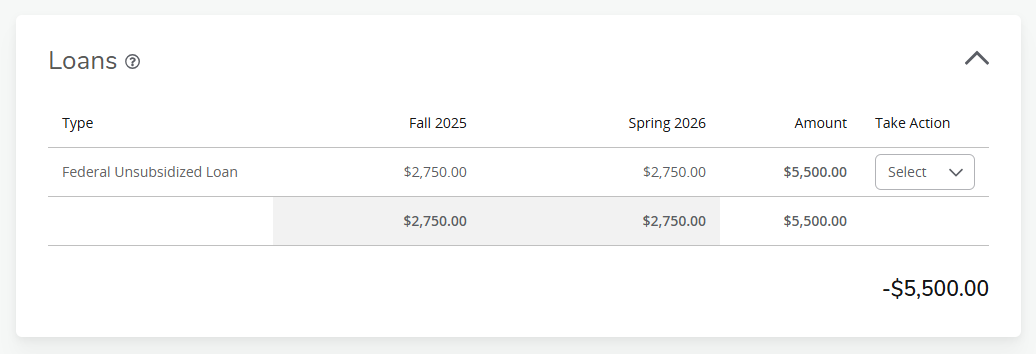
This type of financial aid requires repayment but can be used to assist in paying your educational costs at Wichita State. Loans are limited by grade level and your dependency type (dependent or independent) and must be repaid over time. More information about the different types of loans is available at wichita.edu/studentloans.
Students who accept a Federal Direct Subsidized or Unsubsidized Loan as part of their financial aid are required to complete loan entrance counseling and have a valid master promissory note (MPN) on file with Federal Student before our office can make any Federal Direct Loan payments to students. These steps can be completed at studentaid.gov.
This section is the total aid offered for the year. The offer is typically split equally between the fall and spring semesters.

This section estimates the costs directly charged by Wichita State (the charges you may see on your bill once it's available in July). These may include estimates for tuition, fees, on-campus housing, and on-campus meals. Official tuition and fee rates will be available in July and may vary based on your enrollment and housing choices.
Out-of-State Students: The Tuition & Fees row does NOT yet include tuition discounts since they are included in the Total Financial Aid section.
Estimated Net Costs equal "Costs Billed by WSU" minus the "Total Financial Aid" amount.
You may consider these additional options to assist in meeting your costs at Wichita State. Whether your parent decides to borrow a loan on your behalf, you choose to borrow a private loan, or if you choose to set up a payment plan, you have a variety of options.
The College Financing Plan is a tool to view your official financial aid offer and compare your college costs and available resources. Wichita State uses this standardized format for cost transparency so you can compare your aid offers from most schools in the same format.
You can access your College Financing Plan through your wichita.edu/myWSU account. Under the myFinances section, select the Financial Aid Dashboard link. In the Financial Aid Dashboard, choose the appropriate academic year (such as 2025-2026) and select the College Financing Plan tab.
The College Financing Plan will be available for new, incoming students in mid-April. In the interim, you can view your financial aid on the Offer tab. This is the tab within the Financial Aid Dashboard where you can view and accept/decline your financial aid.
Cost of Attendance
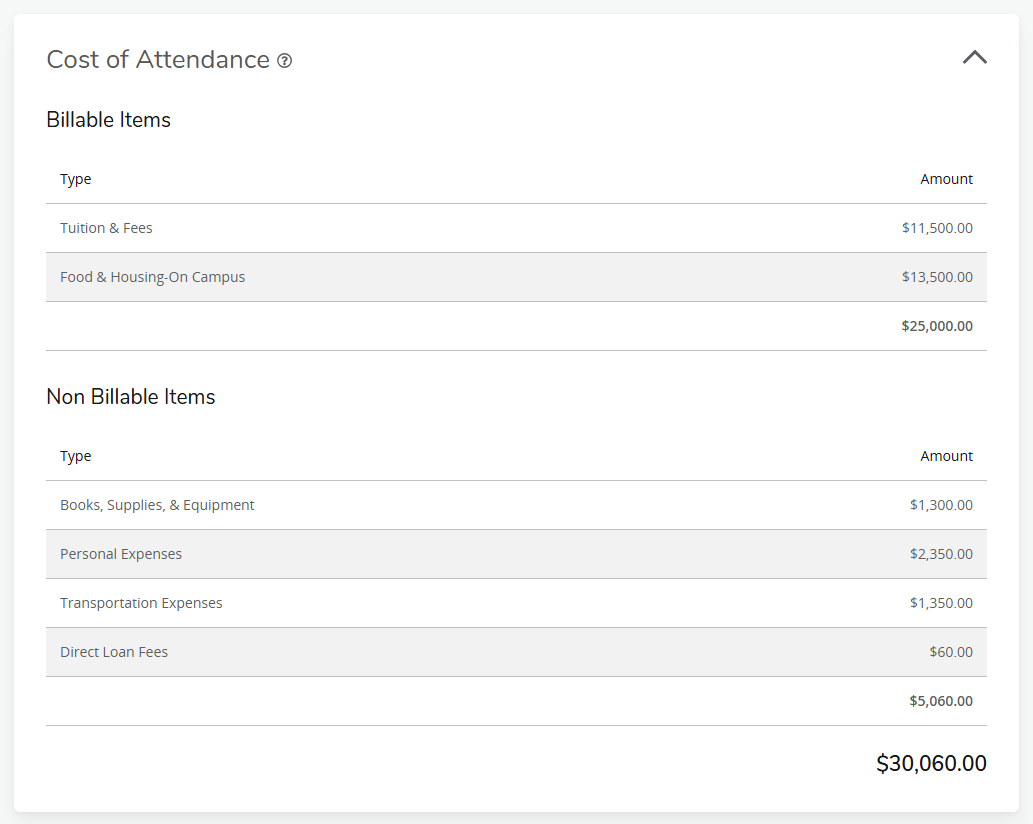
The total of estimated Billable Items and Non Billable Items equals the total estimated Cost of Attendance.
Billable Items (Billed Costs) are estimated charges that will be issues from Wichita State directly (i.e., Tuition & Fees and On-Campus Housing & Food).
Non Billable Items (Other Costs to Consider) will not show up on your billing statement. They reflect the other educational costs you might have for school and living, such as:
Here are a few tricks of the trade to help prepare you for your first year at Wichita State. These tips have been invaluable to first-year students and will set you up for a successful and well-planned first year.
Consider your aid offer and decide what financial aid you plan to accept and how much.
Continue applying for scholarships.
Check out the campus.
Each summer, the Kansas Board of Regents approves, for each state university, the actual tuition and fees, as well as on-campus housing rates for the new academic year. Since this has not yet taken place for the 2025-2026 academic year, the costs shown are based on the current 2024-2025 academic year. The estimated cost of attendance assumes full-time enrollment for fall and spring semesters, and reflects the typical expenses for students with your same residency and major. Actual expenses will depend on your individual choices. Estimated costs can help you plan your own budget.
Certain scholarships have a May 1 acceptance deadline. Additionally, some aid programs, such as the Merit and Incoming Student Scholarships, Shocker Promise, Kansas Comprehensive Grant, the Federal Supplemental Educational Opportunity Grant, and Federal Work Study require that you enroll by June 1.
Tuition discount (Shocker City, Shocker Select, etc.) estimates are shown at the bottom of the Financial Aid Dashboard on the Offer tab under the "Other Resources" section. The items listed there are estimates based on full-time enrollment. Once tuition and fee bills are available in mid-July, you can view your actual discounts/waiver values on your bill through the Student Account Suite in your myWSU portal. More information about tuition discounts is available at wichita.edu/tuitiondiscounts.
No. You do not have to take the full amount of loans offered to you. You may accept all, none, or elect to only take a portion of the total offer. Borrowing a loan for your education is an investment in your future. However, it is important to only borrow what you need to cover your expenses and ensure you have the ability to repay it.
Yes, in most cases. If needed, you can later revise your decision about student loans during the semester and borrow up to the remainder of your loan eligibility for that semester. You can submit a Financial Aid Revision Request online through your myWSU student portal under the myFinances tab. Please be aware all requests to modify a student loan will need to be made prior to the last day of classes for the semester.
Yes. To be eligible for financial aid at Wichita State, you must meet certain federal, state, institutional, and program requirements and you are responsible for reading, understanding, and agreeing to these terms and conditions before accepting your offer. More information about financial aid policies is available at wichita.edu/finaidpolicy.
There’s no magic formula to have all the answers. Preparation will differ from family to family, but we highly recommend families begin and continue discussions about each person's contributions to the costs. Use the estimates included in the aid offer as a baseline for early discussions and plans. Then review your specific tuition and fees bill when it becomes available in July to finalize your decisions.
Changes in finances due to a reduction in income, a change in marital status, death of a parent/spouse, or other special circumstances may greatly impact a family’s ability to pay for college. The Department of Education allows financial aid administrators to use Professional Judgment on a case-by-case basis to make adjustments to the data used in calculating the estimated family contribution (EFC) to reflect these special circumstances.
If your family is experiencing financial issues (such as the loss of a job, reduction of income, or other extenuating circumstance) and would like to discuss financial aid options and information about the process of a Professional Judgment for the next academic year, schedule an appointment to meet with a financial aid advisor at wichita.edu/finaidappt.
Yes, absolutely! We are available for in-person, virtual (Zoom and Teams), and phone appointments. You can set an appointment through Navigate with a financial aid advisor at wichita.edu/finaidappt.
Your financial aid offer is unique to you and was developed according to federal, state, and institutional regulations. All offers are based on available funding levels and are subject to change. Please be aware your aid offer could change based on changes to your FAFSA, enrollment level, or other factors. Wichita State retains the right to revise, cancel, or withdraw offers if we are notified of additional aid resources for you or if aid is not accepted by the deadlines of each aid program. See wichita.edu/finaidpolicy for details.
Financial Aid Offer: A financial aid offer is a document sent by a postsecondary institution to a student that outlines the amounts and details of the financial aid being offered to the student, which may include scholarships, grants, loans, employment, or other forms of financial assistance to pay for college expenses. Sometimes schools refer to these as financial aid “awards”, although this term is outdated. Schools should refer to these as financial aid offers.
Cost of Attendance: The Cost of Attendance consists of the sum of educational costs payable to the school (also referred to as direct or billable costs) and costs paid to others (or indirect, non-billable or discretionary) costs. The Cost of Attendance represents the highest dollar amount of financial aid a student can receive during an award year.
Costs Paid to Others: Costs paid to others(also referred to as indirect, non-billable, or additional costs), are other expenses not paid directly to the school, but associated with receiving an education. These expenses are estimated by the school and may differ from student to student based on their individual circumstances. These expenses may include books, course materials, supplies, equipment, transportation and parking, personal expenses, childcare costs, computer costs, disability expenses, licensure expenses and off-campus rent and food.
Costs Payable to the School: Costs Payable to the school (also referred to as direct or billable costs) generally include tuition, fees, housing, and meals/food (for students residing on campus), health insurance (if minimum insurance coverage is not documented), or any other expenses paid to the school for enrollment.
Educational Loan: Money borrowed from the federal government, a college or university, or a private source like a bank or financial institution to pay for educational expenses and must be paid back with interest.
Federal Loan: Also known as the Direct Loan Program, which allows eligible students and parents to borrow directly from the U.S. Department of Education at participating colleges or universities. Federal student loans include Direct Subsidized, Direct Unsubsidized and the Direct PLUS programs for parents of dependent students and graduate or professional students.
Federal Direct Subsidized Student Loan: A Direct Subsidized Loan is an undergraduate federal student loan based on financial need and offers students a reduced, fixed interest rate and flexible repayment terms. Interest is subsidized, meaning it does not accrue to the borrower, while in an in-school, grace, or deferment period. Annual and aggregate limits apply.
Federal Direct Unsubsidized Student Loan: An unsubsidized loan offers students a fixed interest rate and flexible repayment terms. It is not based on financial need. Interest begins to accrue when the loan is disbursed and can be paid while the student is enrolled or when loan repayment begins. Annual and aggregate limits apply.
Federal Direct Graduate PLUS Loan: Direct Graduate PLUS Loans are federal loans that graduate or professional students use to help pay for education expenses. A credit check for adverse credit history is required for eligibility. Interest begins to accrue when the loan is disbursed and can be paid while the student is enrolled or when loan repayment begins.
Federal Direct Parent PLUS Loan: Direct Parent PLUS Loans are federal loans that parents of dependent undergraduate students can use to help pay for education expenses. Parents must pass a credit check for adverse credit history to qualify for PLUS loans.
Private Loan: A student or parent loan from a bank, credit union, private company, a nonprofit or state-affiliated lender, or from the college or university directly to pay for educational costs. Interest begins to accrue when the loan is disbursed, and repayment begins while the student is still enrolled in school.
Enrollment Status: The number of credits, clock hours, or classes the student is enrolled in, or whether they have withdrawn, graduated, etc. Enrollment status affects eligibility for and the amount of financial aid a student may receive. It also affects when student loans enter repayment status.
Federal Pell Grant: The Pell Grant is a federal grant program designed to assist undergraduate students in low- and moderate-income households to pay for college. The award amount is based on the cost of the institution, SAI, and enrollment status, and is subject to an aggregate limit.
Federal Supplemental Educational Opportunity Grant (FSEOG): A federal grant provided by the institution to qualified undergraduate students who demonstrate exceptional financial need and does not need to be repaid. The amount of funding from this program varies by institution.
Federal Work-Study (FWS): Federal Work-Study provides funding for part-time jobs for undergraduate and graduate students with financial need. Unlike grants and loans, FWS is paid to students as they earn the funds by working.
Grants & Scholarships: Any money provided to students that does not have to be repaid. They can be called grants, scholarships, tuition remissions, gift aid, or tuition waivers. Grants and scholarships are provided based on many different factors.
Need: The student's Cost of Attendance minus their Student Aid Index.
Need-based Aid: Financial assistance provided to students based on their financial situation, determined by completing the FAFSA. Need-based financial aid can take different forms, including grants, scholarships, work-study programs, and low-interest loans, like the federal direct subsidized loan.
Net Price: The difference between the cost of attendance and all grants and scholarships. Net price reflects what the student is expected to pay for their education on their own and can be covered through a variety of sources, including savings, student employment, institutional payment plans, or education loans.
Other Funding Options: Funding options outside of grants and scholarships that a student and their family may use to pay any remaining costs or expenses. This may include loans, student employment, institutional payment plans, or personal savings.
Student Aid Index (SAI): The SAI is the eligibility index used to determine your eligibility for federal, and in some instances, state and institutional need-based student financial aid. Generally, students with a higher SAI are eligible for less need-based financial aid. It is based upon the information provided by the student and their family on the FAFSA.
Verification: A federally mandated process to confirm the accuracy of data provided by selected applicants on the FAFSA. To complete the verification process, the student, their parent(s), or spouse, if applicable, are required to provide certain documents to the school for review. If the documentation the student provides the institution doesn't match what was reported on the FAFSA, verification can result in changes to the student's financial aid eligibility, and/or financial aid offers.

Wichita State is proud to stand with over 600 institutions from all 50 states in an effort to ensure transparency & clarity around student financial aid offers.
The College Financing Plan tab within each student's Financial Aid Dashboard is available beginning in mid-April for incoming students to view and mid-June for returning students to view.